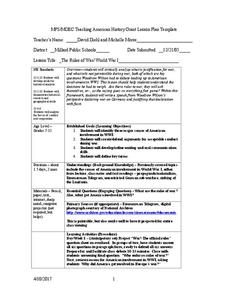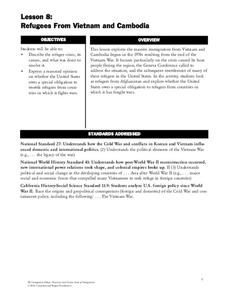K20 LEARN
Ancient Philosophy: Greeks or Romans?
While often not recognized, the ideas of ancient Greek and Roman philosophers still echo today. Using a series of videos and graphic organizers, individuals explore how ancient Greeks and Romans have influenced current Western political...
Center for History Education
How Did the Public View Women’s Contributions to the Revolutionary War Effort?
Calling upon the legacies of Joan of Arc, Elizabeth I, and Catherine the Great, Esther Reed rallied Southern women to support the American Revolution. Using a broadside by Reed and other primary sources, such as poetry, young historians...
Smithsonian Institution
Racism and Removal: Japanese Incarceration During World War II
During World War II people saw how far the government's control would go, but it was at the expense of its citizens. The resource brings the conditions of Japanese American internment camps to light using primary documents. Scholars...
Curated OER
The Insurgency In Iraq: A Quandary for the U.S.
Learners read articles, conduct Internet research and participate in a mock debate to explore the pros and cons of withdrawing from Iraq or remaining in conflict with the insurgency. They consider the difficulties of consensus building...
Smithsonian Institution
Two Perspectives on the Battle of Little Bighorn/Greasy Grass
Learners understand why historians conduct research and the importance of perception when it comes to studying history. The resource covers The Wars of Expansion and the Battle of Little Bighorn/Greasy Grass through group work, debate,...
PBS
The Sixties: Notes from the Ho Chi Minh Trail
Young historians research the rationales for fighting the Vietnam War, and the controversies surrounding it. They watch film clips, examine photographs, and read Lyndon B. Johnson's message to Congress to gather information for a...
University of California
Decolonization
The ripple effect from one small event can impact many others. Young historians research the ripple effect World War II had on decolonization in the second installment of an eight-part series. Through primary and secondary documents as...
Curated OER
Who Started World War I?
Students debate which power was responsible for the outbreak of World War I. In this cause and effects lesson, students research the causes of the outbreak of World War I on ProQuest in preparation for a (limited) reenactment of the...
National First Ladies' Library
The Debate on Slavery
Young historians research the debate over slavery; some students take the pro-slavery side and others the anti-slavery side. They take the role of a character such as a plantation owner, a legislator, a free Black, a slave, or a northern...
Curated OER
Atomic Bomb Debate
Students research the decision to end World War II by dropping the atomic bomb. In this world history lesson, students explore information on the atomic bomb and the decision of the tactics to use it. They also watch a video and plan a...
Curated OER
America's Wars, 1898-1945
Students examine the wars the United States was involved in between 1898 and 1945. In groups, they determine the causes and effects of each war and how each war changed the way the United States handled their foreign affairs. As a class,...
Curated OER
The Rules of War/World War I
Students explore the reasons the United States became involved in World War I. In this World History lesson, students research the reasons Woodrow Wilson made the decisions he did, prepare a debate and write a paper.
Curated OER
Debating Iraq
Students analyze the main themes of President Bush's UN Speech and discussion of the NewsHour report on the Iraq Debate. In this debate instructional activity, students answer pre-listening questions and view a transcript of the speech....
Curated OER
To War Or Not To War?
Seventh graders research the political, societal, and economic factors of World War I, World War II, and the 2001 war against terrorism. They participate in class discussions, write journal entries, and conduct Internet research. ...
Curated OER
The Civil War: On the Homefront
Eighth graders examine the role of Indiana soldiers in the Civil War. In this American Civil War lesson, 8th graders listen to a lecture about the involvement of Indiana soldiers in the war and then analyze letters written home by the...
Curated OER
Italian Enemy Aliens During World War II: Evacuation from Prohibited Zones
Students read and discuss the Enemy Alien Evacuation Order. They perform research by reading newspaper articles from February 1942 as well as investigating available information on the Internet. Students work in groups to create a...
Curated OER
Multiple Perspectives on the Korean War
Students interpret historical evidence presented in primary and secondary resources. In this Korean War lesson, students examine and analyze primary sources regarding U.S. involvement in the Korean War.
The Formation of the Western Alliance, 1948–1949
Silence is golden—even when debating post World War II foreign policy. Using a silent debate format, young historians deliberate whether the United States should have kept a foothold in West Germany after World War II. A series of videos...
University of California
The Civil War: Secession of the South
Was the Southern states' decision to secede from the Union protected by the United States Constitution? Eighth graders discuss the constitutionality of the South's justification for secession, particularly the secession of South...
Theodore Roosevelt Association
Defining America's Role in the World
As the first American president to win the Nobel Peace Prize, and only one of four presidents to do so in United States history, Theodore Roosevelt's foreign policy achievements and preservation of peace are often overshadowed by his...
PBS
President Theodore Roosevelt: Foreign Policy Statesman or Bully?
Can a negative perception of a president's foreign policy harm his or her historical legacy? A project that winds the clock back to the date of Theodore Roosevelt's death puts learners at the editorial desk of a fictional newspaper....
Constitutional Rights Foundation
Refugees From Vietnam and Cambodia
The United States may have pulled its troops from the Vietnam War in 1973, but the conflict was far from over for the citizens living in Asia at the time. An informative resource lets learners know about the wave of over 220,000...
Constitutional Rights Foundation
U.S. Immigration Policy and Hitler’s Holocaust
Though the Statue of Liberty welcomes political refugees to her shores, the welcoming sentiment has not always been reflected in the American citizenry. High schoolers read about the regrettable period in United States history when the...
Curated OER
Freedom by the Fireside: The Legacy of FDR's "Four Freedoms" Speech
Students read and analyze Franklin Delano Roosevelt's 1941 State of the Union Address. They listen to recordings of speeches by F.D.R., answer discussion questions, and participate in a debate.
Other popular searches
- Mexican American War Debate
- Cold War Debate Questions
- Civil War Debate
- Civil War Debate Topics
- Cold War Debate
- Middle East War Debate Causes

























